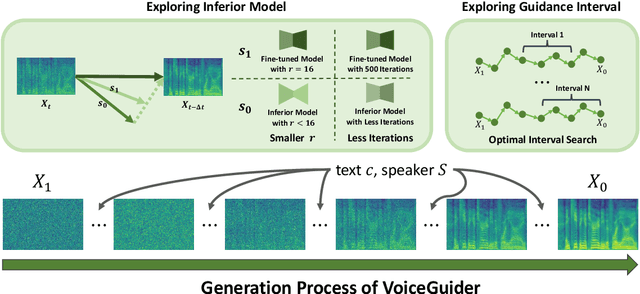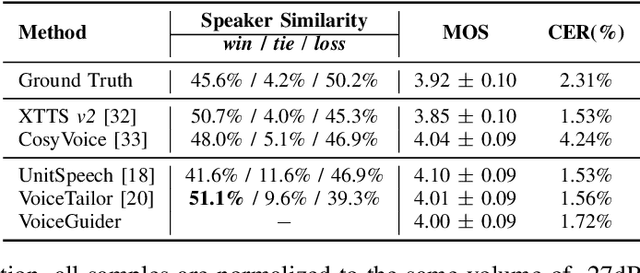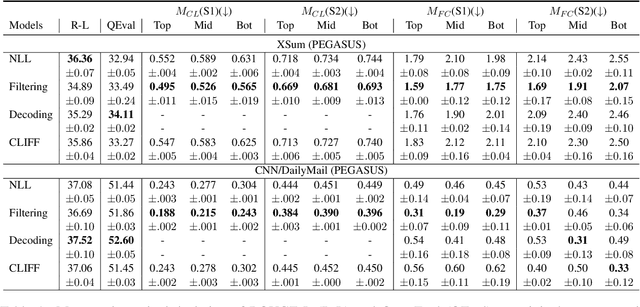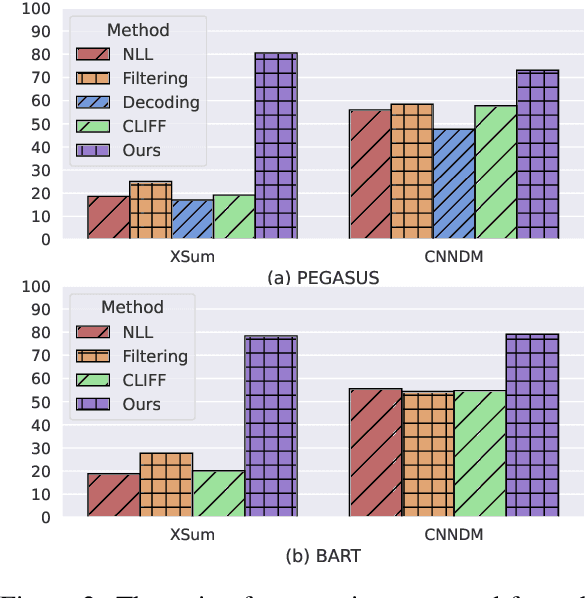Nohil Park
Does Your Voice Assistant Remember? Analyzing Conversational Context Recall and Utilization in Voice Interaction Models
Feb 27, 2025Abstract:Recent advancements in multi-turn voice interaction models have improved user-model communication. However, while closed-source models effectively retain and recall past utterances, whether open-source models share this ability remains unexplored. To fill this gap, we systematically evaluate how well open-source interaction models utilize past utterances using ContextDialog, a benchmark we proposed for this purpose. Our findings show that speech-based models have more difficulty than text-based ones, especially when recalling information conveyed in speech, and even with retrieval-augmented generation, models still struggle with questions about past utterances. These insights highlight key limitations in open-source models and suggest ways to improve memory retention and retrieval robustness.
NanoVoice: Efficient Speaker-Adaptive Text-to-Speech for Multiple Speakers
Sep 24, 2024



Abstract:We present NanoVoice, a personalized text-to-speech model that efficiently constructs voice adapters for multiple speakers simultaneously. NanoVoice introduces a batch-wise speaker adaptation technique capable of fine-tuning multiple references in parallel, significantly reducing training time. Beyond building separate adapters for each speaker, we also propose a parameter sharing technique that reduces the number of parameters used for speaker adaptation. By incorporating a novel trainable scale matrix, NanoVoice mitigates potential performance degradation during parameter sharing. NanoVoice achieves performance comparable to the baselines, while training 4 times faster and using 45 percent fewer parameters for speaker adaptation with 40 reference voices. Extensive ablation studies and analysis further validate the efficiency of our model.
VoiceGuider: Enhancing Out-of-Domain Performance in Parameter-Efficient Speaker-Adaptive Text-to-Speech via Autoguidance
Sep 24, 2024



Abstract:When applying parameter-efficient finetuning via LoRA onto speaker adaptive text-to-speech models, adaptation performance may decline compared to full-finetuned counterparts, especially for out-of-domain speakers. Here, we propose VoiceGuider, a parameter-efficient speaker adaptive text-to-speech system reinforced with autoguidance to enhance the speaker adaptation performance, reducing the gap against full-finetuned models. We carefully explore various ways of strengthening autoguidance, ultimately finding the optimal strategy. VoiceGuider as a result shows robust adaptation performance especially on extreme out-of-domain speech data. We provide audible samples in our demo page.
HyperCLOVA X Technical Report
Apr 13, 2024Abstract:We introduce HyperCLOVA X, a family of large language models (LLMs) tailored to the Korean language and culture, along with competitive capabilities in English, math, and coding. HyperCLOVA X was trained on a balanced mix of Korean, English, and code data, followed by instruction-tuning with high-quality human-annotated datasets while abiding by strict safety guidelines reflecting our commitment to responsible AI. The model is evaluated across various benchmarks, including comprehensive reasoning, knowledge, commonsense, factuality, coding, math, chatting, instruction-following, and harmlessness, in both Korean and English. HyperCLOVA X exhibits strong reasoning capabilities in Korean backed by a deep understanding of the language and cultural nuances. Further analysis of the inherent bilingual nature and its extension to multilingualism highlights the model's cross-lingual proficiency and strong generalization ability to untargeted languages, including machine translation between several language pairs and cross-lingual inference tasks. We believe that HyperCLOVA X can provide helpful guidance for regions or countries in developing their sovereign LLMs.
Entity-level Factual Adaptiveness of Fine-tuning based Abstractive Summarization Models
Feb 23, 2024



Abstract:Abstractive summarization models often generate factually inconsistent content particularly when the parametric knowledge of the model conflicts with the knowledge in the input document. In this paper, we analyze the robustness of fine-tuning based summarization models to the knowledge conflict, which we call factual adaptiveness. We utilize pre-trained language models to construct evaluation sets and find that factual adaptiveness is not strongly correlated with factual consistency on original datasets. Furthermore, we introduce a controllable counterfactual data augmentation method where the degree of knowledge conflict within the augmented data can be adjustable. Our experimental results on two pre-trained language models (PEGASUS and BART) and two fine-tuning datasets (XSum and CNN/DailyMail) demonstrate that our method enhances factual adaptiveness while achieving factual consistency on original datasets on par with the contrastive learning baseline.
On the Analysis of Cross-Lingual Prompt Tuning for Decoder-based Multilingual Model
Nov 14, 2023Abstract:An exciting advancement in the field of multilingual models is the emergence of autoregressive models with zero- and few-shot capabilities, a phenomenon widely reported in large-scale language models. To further improve model adaptation to cross-lingual tasks, another trend is to further fine-tune the language models with either full fine-tuning or parameter-efficient tuning. However, the interaction between parameter-efficient fine-tuning (PEFT) and cross-lingual tasks in multilingual autoregressive models has yet to be studied. Specifically, we lack an understanding of the role of linguistic distributions in multilingual models in the effectiveness of token-based prompt tuning. To address this question, we conduct experiments comparing prompt tuning and fine-tuning on the decoder-based multilingual model, XGLM, with four cross-lingual tasks (XNLI, PAWS-X, POS, NER). According to our study, prompt tuning achieves on par or better performance over fine-tuning across all languages while updating at most 0.13\% of the model parameters. Moreover, we empirically show that prompt tuning is more effective in enhancing the performance of low-resource languages than fine-tuning. Our further analysis shows that the phenomenon is related to the tokenization scheme of the multilingual model.
 Add to Chrome
Add to Chrome Add to Firefox
Add to Firefox Add to Edge
Add to Edge